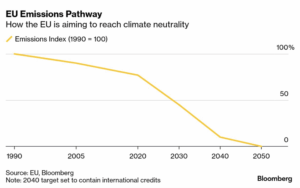Despite most of the world moving away from climate policies, the European Union’s climate ministers approved a 2040 climate change target to cut emissions by 90% from 1990 levels. According to Reuters, in order to avoid going to the COP30 summit in Brazil empty-handed, the EU ministers added flexibilities to cut the deal. Countries can buy foreign carbon credits to cover up to 5% of the 90% reduction goal from 2036 onwards, including a pilot period for the period 2031-2035, which effectively lowers the target to 85% for European industries. Via Reuters, the EU also agreed to consider, in the future, using international carbon credits to meet a further 5% of the 2040 emissions reductions — potentially taking another 5% off the domestic target. The 2040 target is to pave the way to carbon neutrality for EU member countries by 2050.

EU countries also agreed to a 2035 target to cut emissions in a range of 66.25-72.5%, submitting it to the UN before COP began on November 10. To win over skeptical countries, the EU also agreed to weaken other politically sensitive climate policies — including delaying the launch of an upcoming EU carbon market for buildings and road transport by one year, to 2028. A number of countries requested the postponement on concerns that the cap-and-trade program would increase energy prices and trigger a repercussion from voters.
Via Reuters, even with the added flexibilities, some countries, including Poland, Slovakia, and Hungary, opposed the 2040 climate target because it would harm industries’ competitiveness. Polish Deputy Climate Minister Krzysztof Bolesta summed up the concerns, saying, “We don’t want to destroy the economy. We don’t want to destroy the climate. We want to save both at the same time.” But their opposition was not enough to block the agreement, which needed approval from at least 15 of 27 member states, representing at least 65% of the bloc.
The EU has led international efforts regarding climate change at past COP summits and intends to lead again with the new commitments. The flexibilities added to reach an agreement, however, show that industries and governments are skeptical that the EU can make the needed investment in the climate battle with other priorities, including defense.
Background
According to Reuters, the European Commission had originally proposed a 90% emissions-reduction target, with a maximum 3% share of carbon credits. The target was designed to keep the EU on track between its legally-binding goals to cut net emissions by 55% by 2030 and reach net zero emissions by 2050. The EU’s climate science advisers advised against buying foreign CO2 credits, because they would divert investments away from European industries.
Via Reuters, some countries, including France and Portugal, had demanded the 5% carbon credits flexibility, while others, including Poland and Italy, sought 10%. Spain and the Netherlands were among those opposed to further weakening the target. Poland, Italy, the Czech Republic, and others opposed the original 90% target as too restrictive for domestic industries struggling with high energy costs, cheaper Chinese imports, and U.S. tariffs. The Netherlands, Spain, and Sweden cited worsening extreme weather and the need to catch up with China in manufacturing green technologies as reasons for keeping the more ambitious goals.
Analysis
In contrast to the U.S.’s forbearance from implementing climate goals under the Trump administration, the EU is moving full steam ahead to implement drastic emissions cuts that hurt the competitiveness of its industries and raise costs for everyday people. Climate change-based policies that seek to damage the natural gas, oil, and coal industries are clearly souring across the world, as indicated by the COP30’s draft text omitting any mention of “phase-out of fossil fuels,” according to The Guardian. IER’s Robert L. Bradley Jr. explains that situation well: “COP30, a CO2-fest of sorts, is failing. … The new pitch is less about emissions as about the fantasy of cheap wind and solar and batteries heralding a new energy era.”
For inquiries, please contact wrampe@ierdc.org.